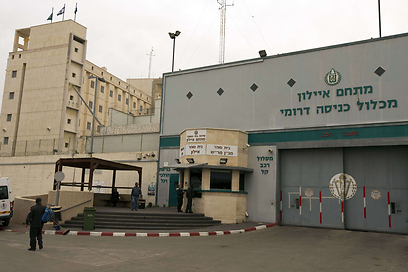
Amar, who assumed the command two months prior to Ben Zygier's suicide, told the investigator that during his training for the role he was told that "for him the man doesn't exist, and the one who manages this man is the intelligence officer."
Related stories:
- MKs demand answers after second 'prisoner x' exposed
- Another 'prisoner x' held in Ayalon Prison
- No indictments in 'Prisoner X' affair
Amar added that the intelligence officer told him "he's taking care of him (Zygier) from A to Z. He said that everything goes through him and didn't explain anything about his treatment. The intelligence officer is the sole caretaker and the one to turn to on the issue."
Amar's statements are controversial. A former Beersheba Prison commander, Shlomo Twizer, told Ynet: "There's no such thing that a prison commander doesn't know what goes on in his prison.
"It's like living in your home and being told 'in this room you don't need to know anything.' Especially when it's a regularly visited wing; there are reports written daily, and these reports are transferred and supervised."

Ayalon Prison. Archive (Photo: AFP)
According to the protocols, the Ayalon Prison commander's statements were confirmed by the prison's operations officer, who related similar statements and claimed all dealings with Sector 15 were under the intelligence officer's jurisdiction.
"They brought me to a stage at which Sector 15 didn't exist for me," he said. "The shroud of secrecy caused the wrong chain. It brought a disconnect. All the interface between Operations and Intelligence with regards to handling the prisoner was defective and faulty."
The Israel Prison Service (IPS) refused to comment on the intelligence officer's care for Zygier.
Aggregate of faults
According to Zygier's family's lawyers, his suicide was made possible by an aggregate of faults, including a faulty transmission from a camera in his room, a partial manning of the guards and surveillance room, and faulty records of Zygier in the critical moments when he apparently committed suicide.
A main part of the lawyers' claims regarded the faulty camera and the intelligence officer's decision not to repair it for "secrecy and safety" considerations.
The lawyers also exposed the fact that another prisoner is being held under similar conditions. "The investigation materials include specific procedures applied in the cases of Section 15's former inhabitant (Yigal Amir) and that of another prisoner held in Section 13," Zygier's attorney said. Section 13 is a similar wing to Section 15, according to the attorney.
Horrifying conditions
The news that another anonymous prisoner was held in an IPS facility drew sharp criticism from Attoreny Rahela Arel, appointed by the internal security minister as the IPS official comptroller.
"This is grave beyond any measure," she told Ynet on Tuesday. "The fact that we're exposed to another atrocious Ben Zygier case should deprive the sleep of anyone who cares for Israeli democracy."
Arel, who also heads the Prisoners and Detainees Rights Clinic at the College of Law and Business, believes this is a multi-system failure. "First and foremost, by the IPS, which apparently doesn't understand its job description.
"Not only does the public not know he is jailed, but the guards, who are supposed to care for his safety, don't know who they are holding or what's his name. What I am given to understand is that once the sign is given, people can be disappeared in the IPS."
Under what conditions is such a prisoner held?
"Horrifying conditions. It feels like a tomb. A small, rectangular room, without daylight. You don't know if the sun is shining or whether it's raining outside.
"The cells offer impossible living quarters. Such a man, who is in solitary confinement anyway, feels in this situation as if he's buried alive. What do you expect to happen? The clock is ticking for Israeli democracy, and for the life of that man."
Top secret unfolds
Attorney Avigdor Feldman, who had met with Zygier a day before the prisoner took his own life, addressed reports pertaining to another prisoner being held under similar conditions to those of "Prisoner X," saying "I know of the existence of at least one more secret prisoner. First hand."
Speaking to Israel's 103FM radio, Feldman noted Tuesday that he could not say whether he met with Zygier, adding that he was in the street and "soon someone will come up behind me and gag me. I can't take any chances."
Nonetheless, the attorney disclosed the fact that the newly revealed "Prisoner X" was "a man of the secret defense services, whose work resulted in a grave security breach that did not lead, to my knowledge, to any dismissals but rather to promotions within his organization."
Feldman added that "the keeping of the secret – contrary to what one might think, albeit naively so, that it was meant to protect national security – was in fact meant to protect the reputation of that organization – to protect and cover up horrendous mishaps that take place without any public supervision."
Knesset Members Ahmad Tibi and Zahava Gal-On – who queried the justice minister in February regarding Zygeir, thereby expediting the lifting of the gag order on the case – also addressed the issue Tuesday, slamming the public security minister, who had previously denied the fact that other secret prisoners were held in Israeli prisons.
"Perhaps you could find out, Mr. (Knesset) Speaker, whether there were any more prisoners, other than the two who were discussed," MK Tibi said in the Knesset. "Prisoners X, Y, Z… Thank you."
MK Gal-On added: "I'm not asking to find out the reasons behind jailing this prisoner, I just want to discuss the Knesset's honor. I would like to say that the Knesset's honor has been put to shame. When on February 18 the minister of public security took the stand and answered the questions of MKs Ahmad Tibi, Dov Khenin, Nachman Shai and mine – some of us asked whether there were additional "prisoners X" detained in Israel. The minister said, and I quote: 'There are no unnamed detainees in Israel.'"
Gal-On further claimed that "it is time for the Knesset to fulfill its role and obligation as the supervising authority of the Israeli government."
Shahar Chai contributed to this report
- Receive Ynetnews updates
directly to your desktop















